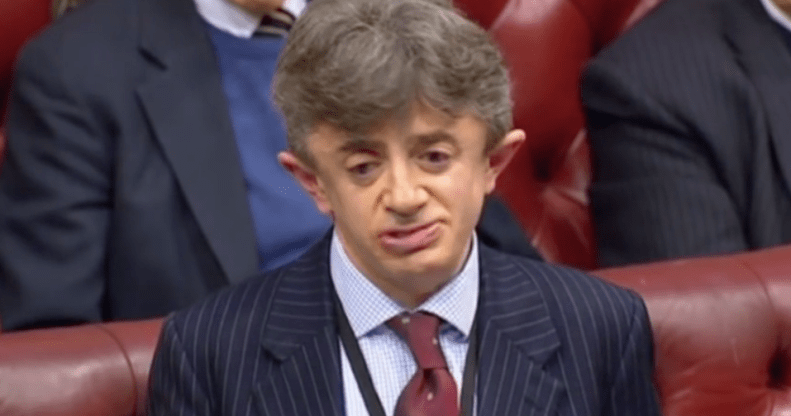‘Let’s work together and get equality of opportunity on the election agenda’, says Tory peer

Lord Shinkwin delivering a speech at the House of Lords. (Screen capture via YouTube)
Conservative House of Lords member Kevin Shinkwin explains why his Workforce Information Bill will be vastly beneficial to both businesses and the LGBT+ workforce.
As John Cope argued in his opinion piece on 11th October: “Improving the experience of LGBT+ people in the workplace isn’t just an issue of fairness.
“It’s also essential for the success of a business.”
I agree, which is why my Workforce Information Bill would make data reporting on all “protected characteristics” in the workforce mandatory for big business.
‘Equality of opportunity remains a dream for too many,’ says Lord.
Many firms claim that their most important asset is their people and the talents that they bring.
Yet, as John made clear, not everyone feels able to bring their best, their whole self to work. Not everyone enjoys the equality of opportunity to make the most of what they have and climb as far as they can.
And what many of those who experience inequality of opportunity have in common is that they have protected characteristics as defined by the Equality Act 2010.
Still, almost 10 years after the Act was passed, equality of opportunity remains a dream for too many.
Stonewall found that, in the last year, 35 percent have hidden or disguised that they are LGBT+ at work because they were afraid of discrimination; and 18 percent said they were discriminated against while trying to get a job.
In 2017, ethnic minorities had an employment gap of almost 13 percent compared to white workers. The employment gap for disabled people, of which I am one, is still hovering around 30 percent.
Less than one percent of CEOs in Fortune 500 companies are queer.
Rainbow flags may be all the rage with big business, but how deep does a commitment to genuine equality of opportunity really go?
In May this year, there were only four openly LGBT+ CEOs leading America’s Fortune 500 companies – less than one percent.
Similarly, there are more CEOs in our FTSE 100 called Steve than there are female CEOs or CEOs from an ethnic minority background. Why?
If good business really is all about people, how does it make sense to restrict your talent pool or limit peoples’ success because of negative attitudes and pre-conceptions?
It doesn’t.
Nurturing a diverse workforce is not something “good” to be done at a cost to your bottom line; it’s something that adds value to it.
Companies that are LGBT-inclusive are more productive, profitable and workers are more attractive.
Credit Suisse ESG found that more LGBT-inclusive firms average three percent higher performance.
While LGBT Great, which promotes LGBT equality in the investment and savings industry, have shown that 80 percent of all millennials – the future of the workforce – actively seek employers that visibly value diversity and inclusion.
The 30 Percent Club have also found that companies with greater gender diversity on their executive teams are 21 percent more likely to experience above-average profitability than those worse at it.
These compelling commercial reasons are why several professional bodies, including the Institute of Directors, have called for a more open and data-driven approach to improving diversity.
After all: “What gets valued gets measured and what gets measured gets done”.
The Government recognised this when they introduced mandatory gender pay gap reporting in 2017 – to ‘create opportunities’ for women and employers and add £150 billion to the economy.
It’s now time to honour the logic of that reform: if we want to harness all of the latent potential in our economy, there must be equality of opportunity for all protected characteristic groups.
That’s why my Bill requires companies with 250 or more employees to report data relating to pay, recruitment, career progression and a breakdown of their leadership at board level, across all protected characteristics.
‘If we push for this together, we can get the issue of equality of opportunity on the political radar screen’.
I’m very grateful for Matt Cameron’s support who, as managing director of LGBT Great, said: “The collection, review and measurement of diversity data is essential to addressing representation inequalities in the workplace.
“This quantifiable information will help shine a spotlight on the good whilst highlighting the areas which need improvement to ensure that the UK workforce becomes more balanced across all intersections of society.
“Significantly, business responds well when the metrics are clear and mandatory reporting will help shift the focus towards positive actions which will improve overall outcomes for both employers and employees alike.”
Leading figures across the business, BAME, and disability communities are also on board.
With an election expected soon, I really believe that if we push for this together, we can get the issue of equality of opportunity on the political radar screen for the December 12 general election.
That’s why I am calling on the Party of Business and Opportunity to commit in their manifesto to making workforce data reporting, as set out in my Bill, mandatory for big business.

